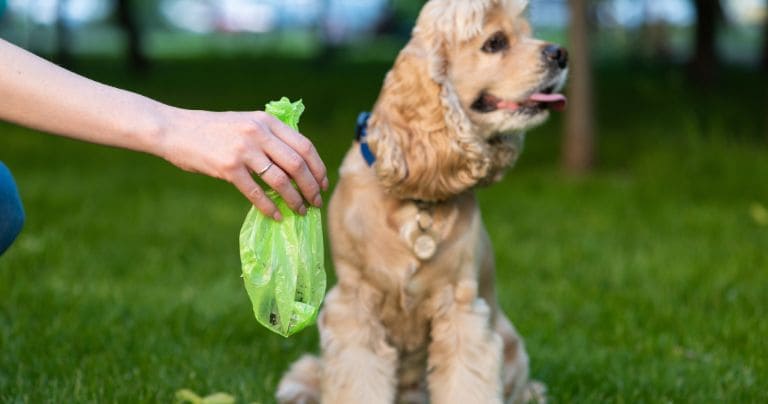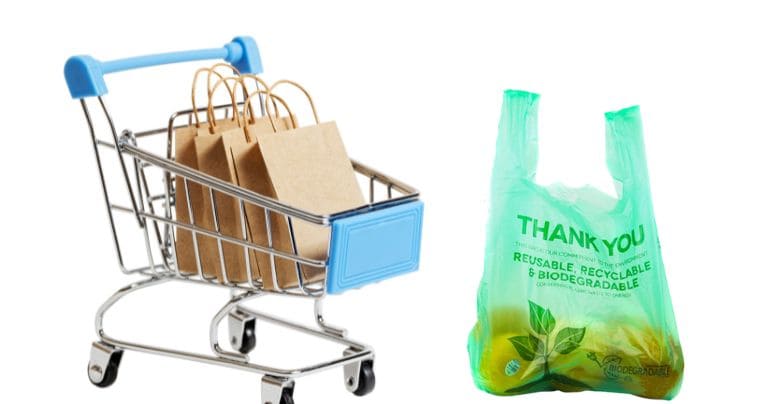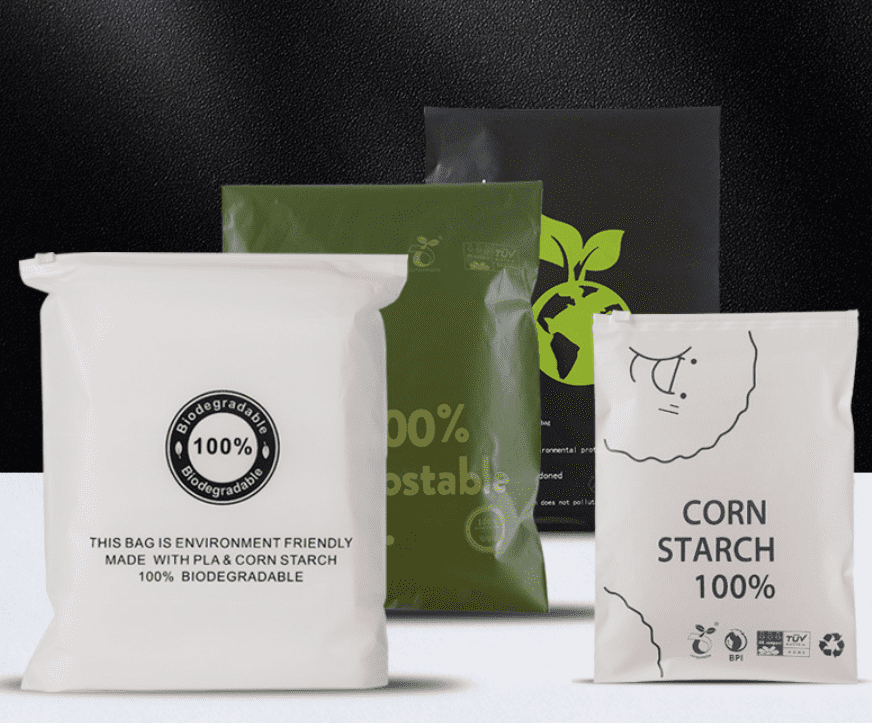Table of Contents
Ever thought about how long those regular plastic bags, even the ‘biodegradable’ ones, take to disappear? Spoiler alert – it’s hundreds of years! That’s where compostable trash bags, made from bioplastics and approved by the Biodegradable Products Institute, come in. Eco-friendly bags, on the other hand, are made from plants. They naturally break down, which means less plastic trash and a healthier planet. They are perfect for disposing of kitchen garbage.
If you love our planet and want to help keep it clean, compostable trash bags can be a great helper. These bags are special because they’re made from stuff that can break down naturally. You can even put them in your compost pile with things like apple cores and fallen leaves, and they will break down just like the rest. Just like magic, they decompose along with everything else. These bioplastics are designed to be home compostable.
Not only do compostable trash bags made from plant starches help divert garbage from landfills, but they also contribute to the production of nutrient-rich soil. By picking these compostable bags over regular plastic ones, you can help make the world a greener place.
Say goodbye to traditional plastic trash bags and embrace the benefits of compostable bioplastics alternatives. Join the sustainable jungleabout movement towards reducing plastic waste and choose compostable trash bags for your everyday needs. Shop now for a more eco-friendly solution to garbage.
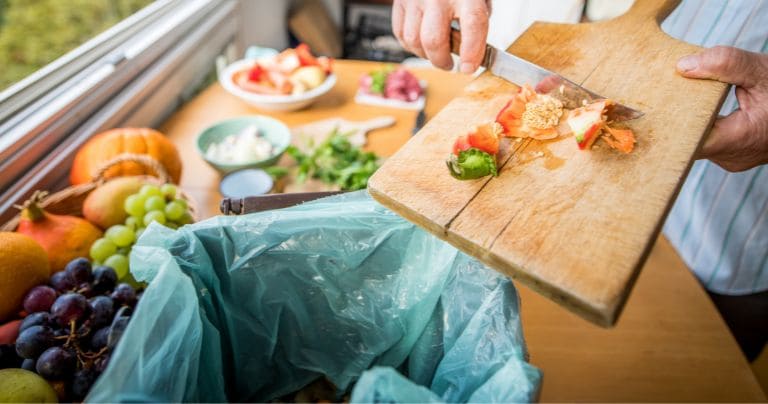
Understanding the Difference: Compostable vs Biodegradable Garbage Bags
Compostable bags are specifically designed for composting environments.
Compostable trash bags are a revolutionary solution for reducing environmental impact. Unlike traditional plastic bags, these bioplastics are specifically designed to break down in composting environments. These bags are made from cool stuff like cornstarch, vegetable oils, or plant fibers. That’s why they’re great for throwing away things like apple cores, leaves, and even doggie doo.
When you dispose of biodegradable garbage bags in a compost bin or facility, they will undergo composting. When these bags break down, tiny creatures called microorganisms munch on them and turn them into organic matter. That’s just a fancy way of saying they turn into super-rich soil. That means the bags not only disappear but also help create awesome dirt that makes plants super happy.
Compostable bags offer several advantages over regular plastic bags for garbage. By using these bags, we can stop filling up landfills with trash. If we put organic stuff like food scraps in a landfill, it makes harmful gases. But if we compost them in these bags, we avoid that problem. By using compostable bags in your kitchen or yard waste bins, you actively participate in reducing methane emissions and promoting sustainable practices when you shop.
Biodegradable bags can break down over time but may not fully decompose.
Biodegradable kitchen trash bags and compostable ones may sound the same, but there’s a big difference between them.’Biodegradable’ is a big word that just means something can break apart into tiny pieces over time, especially when it’s out in the sunshine or rain. However, this doesn’t necessarily mean they will fully decompose or convert into harmless substances like compost. It’s important to shop with us for the right garbage bags for your needs.
Compostable trash bags, made from vegetable starches and compostable polymers, often contain additives that accelerate their breakdown process compared to regular plastic bags. These additives make them more susceptible to degradation by microorganisms and environmental conditions. However, without specific conditions found in industrial facilities or home composting systems, compostable bags might take years or even decades before breaking down completely. So, when shopping for trash bags, consider using compostable waste alternatives.
But it’s super important to remember that biodegradable bags can sometimes leave behind teeny tiny bits of plastic called ‘microplastics.’ But these little pieces, which we call microplastics, don’t disappear fast – they can stick around our world for hundreds of years! They can get mixed up in our dirt, our streams and ponds, and even in the food we eat. This can be bad for our beautiful planet and our health. However, using compostable materials like compostable polymers or home compostable waste can help mitigate these issues.
Compostable bags offer a more environmentally friendly solution.
Compostable options like biodegradable trash bags and biodegradable garbage bags undoubtedly offer a more environmentally friendly solution. Since they are designed specifically for composting environments, these waste bags ensure a complete breakdown into organic matter without leaving behind harmful residues or microplastics.
Compostable bags are super cool because they can turn into dirt over time, unlike regular plastic bags that just make a lot of trash. These bags help us make less garbage and more yummy food for plants. This means we can grow better plants and veggies, and we don’t need to use as many chemicals.
By opting for compostable trash bags, you actively participate in closing the loop of resource consumption by returning organic materials back to nature. It’s a small step we can take, but it can make a big difference for our planet and the people who’ll live here after us.
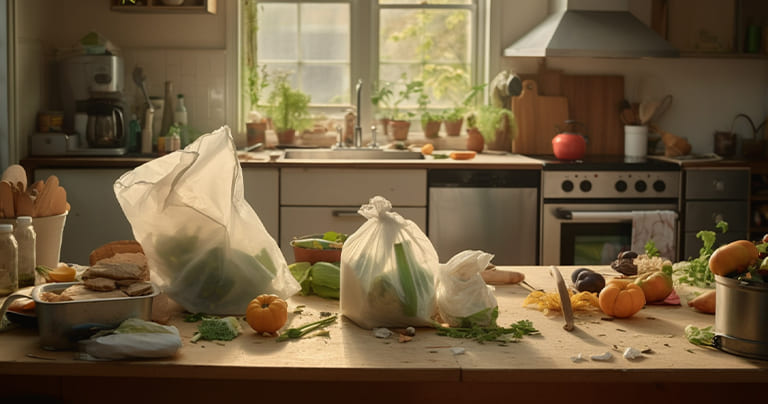
Benefits of Compostable Trash Bags for Reducing Plastic Waste
Minimizing Plastic Waste in Landfills and Oceans
Compostable trash bags offer an effective solution to combat the growing problem of plastic waste. By choosing compostable bags over regular plastic ones, we’re doing our part to keep plastic out of landfills and our oceans. Regular plastic bags aren’t friends with our planet—they stick around for hundreds of years which isn’t cool at all. But, compostable bags, made from stuff like cornstarch or sugarcane, are a much better choice because they are kind to Mother Earth. These materials break down much faster, ensuring that they do not linger in our ecosystems for centuries.
Reducing Reliance on Non-Renewable Resources
One of the key benefits of compostable trash bags is their ability to reduce our reliance on non-renewable resources like petroleum. The production of traditional plastic bags heavily depends on petroleum extraction and refining processes, which contribute to greenhouse gas emissions and environmental degradation. By choosing compostable alternatives, we can help shift away from this unsustainable practice and promote a more environmentally friendly approach.
Promoting a Circular Economy
Compostable trash bags play a vital role in promoting a circular economy by providing a sustainable waste management option. And what’s really cool is that we can toss our leftover food into these bags. Then, this food waste gets picked up and mixed with other organic stuff at composting centers, where it all breaks down together. Here, the contents undergo controlled decomposition processes that transform them into nutrient-rich compost. This compost can then be used to enrich soil for agriculture or landscaping purposes, closing the loop and minimizing waste generation.
By utilizing compostable trash bags, individuals and communities actively participate in diverting organic waste from landfills while simultaneously creating valuable resources for future use.
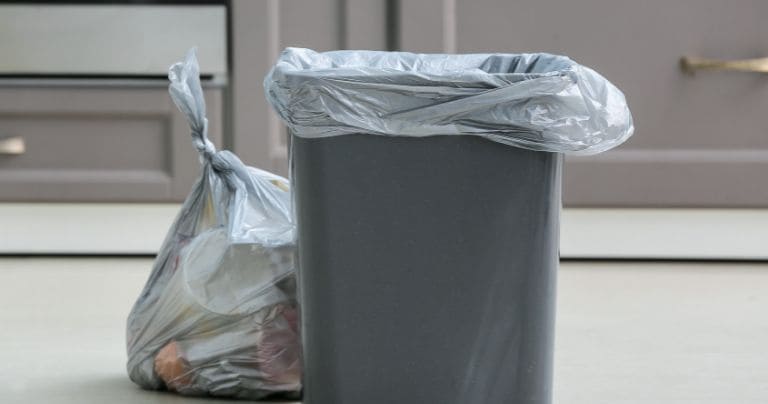
Environmental Impact: Comparing Effectiveness of Compostable and Biodegradable Bags
Lower Carbon Emissions during Production
Compostable trash bags offer a significant advantage over biodegradable bags. Compostable bags are typically made from bioplastics derived from renewable resources such as cornstarch or sugarcane. These materials require less energy and emit fewer greenhouse gases during the manufacturing process compared to traditional plastic bags.
By choosing compostable bags, consumers can actively contribute to minimizing their carbon footprint. The use of renewable resources in the production of biodegradable trash bags helps reduce reliance on fossil fuels, which are major contributors to climate change. The lower carbon emissions associated with compostable bag production make them a more environmentally friendly option for disposing of biodegradable trash.
Harmful Microplastics Released by Biodegradable Bags
One concerning aspect of biodegradable bags is their potential to release harmful microplastics into the environment as they degrade. Unlike compostable bags that break down into organic matter through natural processes, biodegradable bags often undergo degradation by exposure to sunlight or heat. This breakdown can result in the release of tiny plastic particles that pose a threat to ecosystems and wildlife.
Microplastics have been found in various environments, including oceans, rivers, and even within organisms. These particles not only contaminate water sources but also enter the food chain, potentially causing harm to marine life and other animals. By opting for compostable trash bags instead of biodegradable ones, individuals can help prevent the release of these detrimental microplastics.
Contributing to a Healthier Ecosystem
Choosing compostable trash bags has broader implications for ecosystem health beyond just reducing carbon emissions and preventing microplastic pollution. Compostable bag materials derived from renewable resources are more likely to decompose naturally without leaving behind harmful residues or toxins.
When composted correctly in specialized facilities or home composting systems, biodegradable trash bags can break down into nutrient-rich organic matter. This compost can then be used to enrich soil and support the growth of plants, contributing to a healthier ecosystem. By embracing biodegradable trash bags, individuals actively participate in the cycle of sustainability by reducing waste and promoting natural processes.

Exploring the Best Options: Top Choices for Compostable Trash Bags
It’s important to consider a few key factors when choosing biodegradable garbage bags or compostable trash bags. By looking for certifications like “ASTM D6400” or “EN 13432,” you can ensure the authenticity and reliability of the biodegradable plastic bags. Brands such as BioBag, EcoSafe, Green Earth, Monopacking offer good choices for biodegradable garbage bags. To help you make an informed decision, let’s delve into these options further.
Certifications Matter: Ensuring Product Authenticity
Certifications such as “ASTM D6400”, “OK Compost home”, and “EN 13432” are crucial for determining whether biodegradable garbage bags and waste bags meet industry standards. The American Society for Testing and Materials (ASTM) issues the former certification, ensuring that the bags meet specific criteria for biodegradability and compostability. The European Norm (EN) provides the latter certification, guaranteeing adherence to strict European standards.
Trusted Brands: BioBag, EcoSafe, and Green Earth
When searching for reliable compostable trash bags, several brands stand out. BioBag has established itself as a leader in this field, offering a wide range of compostable bag options made from renewable resources like cornstarch. Their bags are durable yet break down naturally in composting environments.
EcoSafe is another brand known for its commitment to sustainability. Their biodegradable trash compostable bags are made from plant-based materials such as GMO-free cornstarch or vegetable oils. With different sizes available, they cater to various needs while ensuring minimal environmental impact.
Monopacking is a trusted compostable trash bags. Their bags are designed with strength in mind while still degrading effectively in composting conditions.
Factors to Consider: Thickness, Capacity, and Price
Choosing the best compostable trash bag for your needs involves considering factors like thickness, capacity, and price. While a thicker bag may offer more durability, it can also contribute to longer decomposition times. Thinner bags, on the other hand, may degrade faster but could be prone to tearing.
Capacity is another important consideration when choosing biodegradable garbage bags or compostable trash bags. Ensure that the bag you choose is large enough to accommodate your typical volume of waste without frequent replacements. This will help minimize environmental impact and inconvenience associated with using biodegradable trash bags or compost bags.
Price is often a determining factor for many consumers. While compostable garbage bags may be slightly more expensive than traditional plastic ones, they are an investment in sustainability. Consider the long-term benefits and potential cost savings associated with reducing landfill waste.
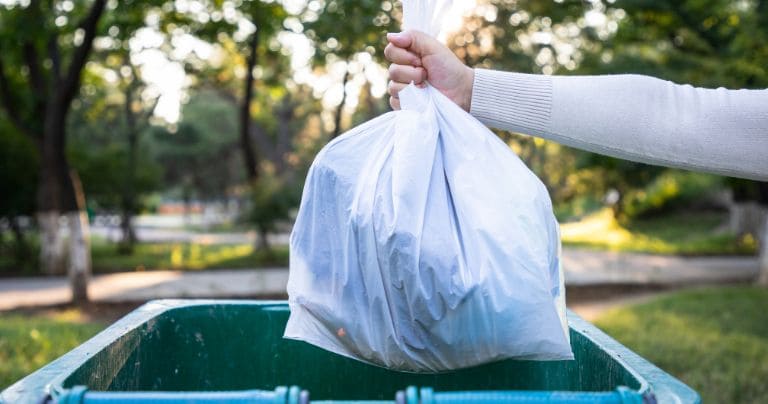
Types and Sizes: Choosing the Right Compostable Trash Bag for Your Needs
There are various sizes available to suit different needs. From small kitchen bin liners to large outdoor trash bags, you can find a size that fits your requirements perfectly. There are different types of compostable trash bags, including drawstring bags, handle-tie bags, and extra-strong options for heavy-duty use. It’s essential to consider your specific needs before purchasing compostable trash bags to ensure they meet your expectations.
Different Sizes
Compostable trash bags come in a range of sizes to accommodate various waste disposal needs. Whether you have a small household or a larger one, you can find the perfect size to fit your bins. Here are some common sizes you’ll come across:
- Small kitchen bin liners: These compostable trash bags are designed for smaller waste bins typically found in kitchens or bathrooms. They usually have a capacity of around 2-4 gallons.
- Medium-sized liners: Suitable for average household waste bins, these kitchen compost bags bags typically hold between 8-13 gallons.
- Large outdoor trash bags: If you need compostable garbage bags for outdoor use or larger indoor bins, opt for the ones with capacities ranging from 30-50 gallons.
It’s crucial to choose the right size of compostable garbage bags or biodegradable trash bags based on the amount of waste generated in your household and the type of bins you use regularly.
Different Types
Apart from varying sizes, compostable trash bags also come in different types with unique features that cater to specific preferences and needs:
- Drawstring Bags: These compostable trash bags feature drawstrings at the top that allow easy closing and carrying without any spillage or mess.
- Handle-Tie Bags: Designed with convenient handles built into the bag itself, handle-tie compostable trash bags make tying up and lifting garbage hassle-free.
- Extra-Strong Options: For heavy-duty use or when dealing with sharp or bulky waste, you can opt for extra-strong compostable trash bags that offer enhanced durability and tear resistance.
Considering the type of bags available, such as ok compost home bags, will help you choose one that aligns with your usage habits and makes waste disposal a more convenient task.
Consider Your Specific Requirements
When selecting compostable trash bags, it’s crucial to consider your specific requirements. Here are a few factors to keep in mind:
- Waste Volume: Determine the average amount of waste generated in your household to select an appropriate bag size of biodegradable trash bags or compostable garbage bags that won’t overflow or leave excess space.
- Bin Size: Measure the dimensions of your bins to ensure the compostable trash bags fit properly without slipping or causing any inconvenience.
- Usage Frequency: If you have regular waste disposal needs, you might want to stock up on larger quantities or choose multipacks to avoid running out of compostable trash bags frequently.
- Environmental Certifications: Look for compostable trash bags that meet recognized standards and certifications, such as ASTM D6400 or EN 13432, ensuring they truly break down into organic matter in a composting environment.
By considering these factors, such as the quality and durability of garbage bags, you can make an informed decision and choose the right compostable trash bag that suits your needs while also being environmentally friendly.

Do compostable trash bags break down in landfills?
Compostable bags, as the name suggests, are designed to break down naturally and contribute to the environment’s well-being. However,The story takes a different turn.
Landfills lack the necessary oxygen and microbial activity for compostable bags to decompose properly. Unlike industrial composting facilities where controlled environments facilitate efficient breakdown, landfills are not optimized for organic waste degradation. In these anaerobic conditions, where oxygen supply is limited or absent altogether, compostable bags may not break down efficiently.
The absence of oxygen in landfills inhibits the growth of aerobic microorganisms responsible for breaking down organic matter. These microorganisms require oxygen to thrive and effectively decompose materials like compostable bags. As a result, without sufficient oxygen levels, the decomposition process slows down significantly.
Moreover, landfills often have compacted layers of waste, including compostable garbage bags, that restrict airflow and further impede proper decomposition. The compression caused by heavy machinery compacts the layers of trash tightly together. This compression creates an environment that lacks air pockets crucial for microbial activity and effective decomposition. Additionally, using ok compost home certified bags can help promote more efficient decomposition in landfills.
To maximize their environmental benefits, it is essential to divert compostable bags from traditional landfills and send them to industrial composting facilities instead. Industrial composting facilities provide ideal conditions for organic waste breakdown with adequate oxygen levels and microbial activity.
In these specialized facilities, compostable bags can be processed alongside other organic materials such as food scraps and yard waste. The controlled environment allows for efficient decomposition through aerobic processes facilitated by microorganisms present in the soil.
By sending compostable bags to industrial composting facilities rather than landfills, we can ensure they contribute positively to our ecosystem. These facilities create nutrient-rich soil amendments that can be used in various agricultural applications or landscaping projects.
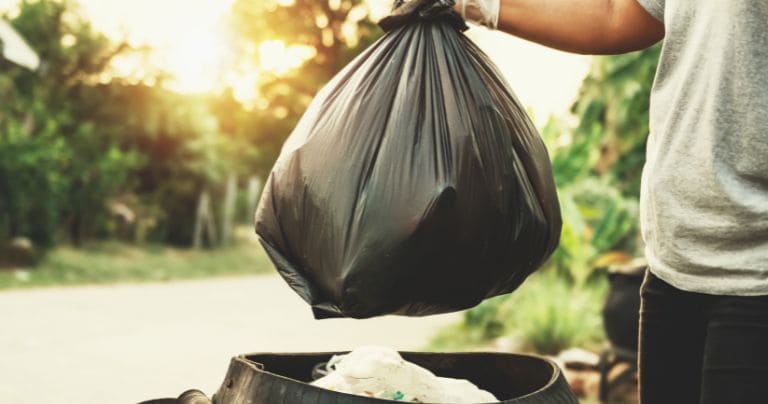
Why are compostable garbage bags so expensive?
Compostable trash bags have gained popularity in recent years due to their eco-friendly nature. However, one common concern among consumers is the relatively high cost compared to traditional plastic bags.
Costlier production process
The production process of compostable bags using plant-based materials can be more expensive than traditional plastic bag manufacturing. Unlike regular plastic bags derived from fossil fuels, compostable bags are made from renewable resources such as cornstarch or vegetable oils. The extraction and processing of these natural materials require additional steps and specialized equipment, which contribute to the overall cost.
Moreover, ensuring that compostable bags meet specific standards for biodegradability and environmental impact adds complexity to the production process. Extensive testing and certification procedures are necessary to ensure that these bags decompose properly without leaving harmful residues in the environment.
Limited availability and demand
Another factor driving up the price of compostable garbage bags is their limited availability in comparison to traditional plastic alternatives. While awareness about sustainable alternatives is increasing, many stores still prioritize stocking conventional plastic products due to higher demand.
The lower demand for biodegradable trash bags and compostable options results in smaller production volumes, which leads to higher manufacturing costs per unit. As more people embrace eco-friendly practices and demand for biodegradable trash bags and compostable products grows, economies of scale may come into play, potentially reducing prices in the future.
Long-term cost savings
Although compostable garbage bags may seem expensive upfront, they offer long-term cost savings by mitigating environmental damage caused by plastic waste. Traditional plastic bags take hundreds of years or more to break down naturally, contributing significantly to pollution and harming wildlife.
In contrast, compostable trash bags degrade much faster under proper conditions, reducing their impact on ecosystems. By choosing these environmentally friendly alternatives, individuals can help reduce the amount of plastic waste that ends up in landfills or oceans. This, in turn, reduces the need for costly cleanup efforts and prevents harm to marine life.
Furthermore, some municipalities offer incentives for using compostable bags, such as reduced disposal fees or access to community composting programs. Taking advantage of these initiatives can further offset the initial cost of compostable garbage bags.
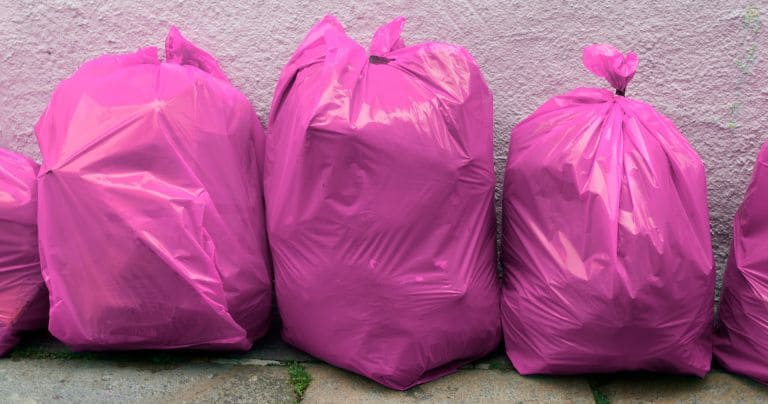
How long do compostable bags take to decompose?
Decomposition time varies depending on factors like material composition and environmental conditions. Compostable bags, as the name suggests, are designed to break down naturally over time. However, the speed at which they decompose can vary based on several factors.
Compostable bags typically break down within 3 to 6 months in industrial composting facilities. These facilities provide optimal conditions for decomposition, including controlled temperature, moisture levels, and microbial activity. In such environments, compostable bags can efficiently degrade into organic matter that enriches the soil.
On the other hand, in home composting systems where conditions may not be as ideal or consistent, decomposition may take longer. It can range from 6 months to a year for compostable bags to fully break down in these settings.
The specific material composition of compostable bags plays a crucial role in their decomposition rate. These bags are often made from plant-based materials such as cornstarch or sugarcane fibers. These natural materials contain carbon compounds that microorganisms can consume during the decomposition process.
During decomposition, microorganisms like bacteria and fungi feed on the carbon compounds present in compostable garbage bags. As they consume these compounds, they release enzymes that break down the bag’s structure into smaller pieces. Over time, this breakdown continues until only small fragments of the compostable garbage bags remain.
In industrial composting facilities with optimized conditions for microbial activity and oxygen availability, this process occurs more rapidly compared to home composting systems where conditions may fluctuate. The presence of oxygen is essential for aerobic decomposition processes that produce carbon dioxide as a byproduct.
It is important to note that while compostable bags will eventually decompose under proper conditions, they should not be treated like regular plastic bags and disposed of in traditional waste streams. If sent to landfill or mixed with regular trash, even compostable bags may take years or decades to break down due to limited oxygen availability and slower microbial activity.
To ensure the proper decomposition of compostable bags, it is crucial to dispose of them in designated composting facilities or home composting systems. This allows the bags to be exposed to the necessary conditions for efficient breakdown.
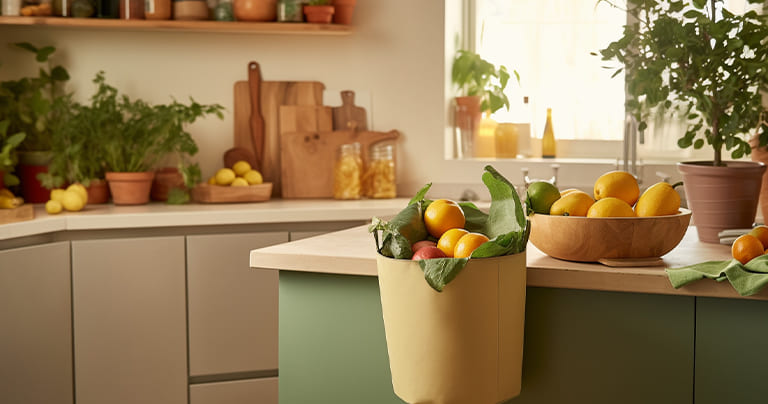
Finding the Best Deals and Staying Updated on Trends in Compostable Bags
Finding the best deals and staying updated on trends can help you make informed choices while contributing to a more sustainable environment. Here are some tips to help you shop wisely for compostable bags and stay up-to-date with the latest developments:
Look for discounts or bulk purchasing options from reputable retailers or online platforms.
- Reputable Retailers: Start your search by checking out well-known retailers that specialize in eco-friendly products. These retailers often offer a wide range of compostable bag brands, allowing you to compare prices and find the best deals.
- Online Platforms: Online marketplaces like Amazon provide a convenient way to browse through various compostable bag options. Look for sellers offering discounts or bulk purchasing options to save money in the long run.
Stay informed about new product developments and advancements in compostable bag technology through industry publications or websites.
- Industry Publications: Subscribe to industry publications focused on sustainability and waste management. These publications often feature articles highlighting new product developments, technological advancements, and emerging trends in compostable bag manufacturing.
- Websites: Regularly visit websites dedicated to eco-friendly products and sustainable living. Many of these sites provide updates on the latest compostable bag innovations, as well as reviews from customers who have tried different brands.
Consider joining sustainability-focused communities or forums for recommendations and updates on the latest trends.
- Communities: Engage with like-minded individuals by joining sustainability-focused communities or forums online. These communities often share valuable insights, recommendations, and personal experiences with different compostable bag brands.
- Forums: Participate actively in forums where discussions revolve around environmental conservation, waste reduction, and sustainable practices. By interacting with others who value eco-friendly solutions, you can gain valuable knowledge about new trends in compostable bags.
By following these tips, you can find the best deals on compostable trash bags while staying updated on the latest trends in this rapidly evolving industry. Remember to consider factors such as product quality, certification (such as BPI certification for compostability), and the use of vegetable oils in manufacturing when making your purchasing decisions.
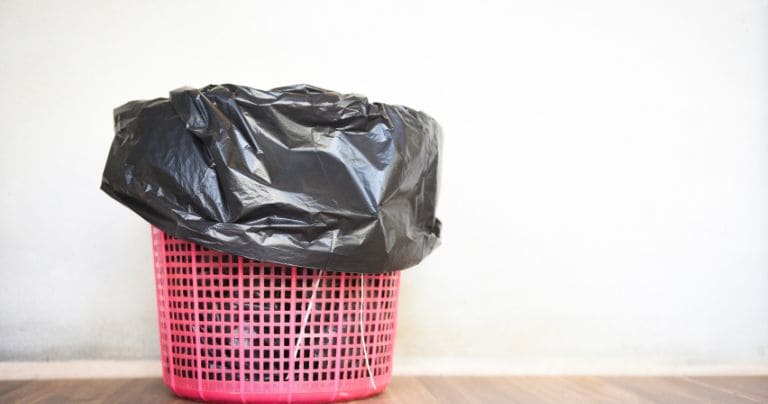
Conclusion: The Value of Compostable Trash Bags
In conclusion, compostable trash bags offer a sustainable alternative to traditional plastic bags, helping to reduce plastic waste and minimize environmental impact. By understanding the difference between compostable and biodegradable bags, we can make informed choices that align with our eco-friendly goals.
Compostable trash bags provide numerous benefits for reducing plastic waste. They break down into organic matter when properly composted, minimizing their impact on landfills and oceans. This makes them an excellent choice for those looking to make a positive environmental contribution.
When comparing the effectiveness of compostable and biodegradable bags, it becomes clear that compostable options are more efficient in terms of decomposition. They undergo a specific process that converts them into nutrient-rich soil, while biodegradable bags may simply break down into smaller pieces without fully returning to the environment.
Finding the best options for compostable trash bags involves considering factors such as durability, capacity, and price. There are various types and sizes available to suit different needs, ensuring you can find the perfect fit for your household or business.
While some may question whether compostable trash bags break down in landfills, it’s important to note that they require specific conditions found in industrial composting facilities to decompose properly. Therefore, it is recommended to dispose of them in designated composting areas or facilities whenever possible.
One common concern raised about compostable garbage bags is their cost. It’s true that they tend to be more expensive than traditional plastic alternatives due to their specialized production processes and materials. However, considering the long-term environmental benefits they offer, investing in these eco-friendly options is well worth it.
As for how long it takes for compostable bags to decompose, this depends on various factors such as temperature and moisture levels. Generally speaking, under ideal conditions in a proper composting facility, they can break down within a few months or up to a year.
To stay updated on the latest trends and find the best deals on compostable trash bags, it’s recommended to follow reputable sources and eco-conscious communities. They often share valuable insights, reviews, and discounts that can help you make informed purchasing decisions.
In conclusion, compostable trash bags provide a sustainable solution for reducing plastic waste. By choosing these environmentally friendly alternatives, we can contribute to a cleaner planet for future generations. So why not take the step towards a greener lifestyle by incorporating compostable trash bags into your daily routine?
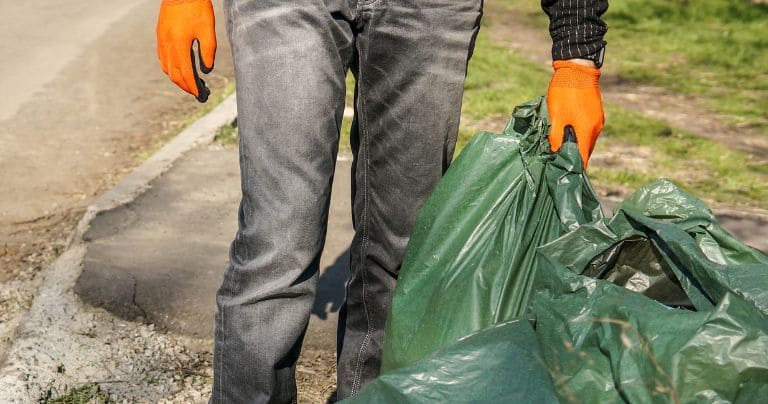
FAQs
Are compostable trash bags suitable for all types of waste?
Compostable trash bags are generally suitable for organic waste such as food scraps, yard trimmings, and other biodegradable materials. However, they may not be suitable for certain types of non-biodegradable or hazardous waste. It’s important to check the specific guidelines provided by the manufacturer or consult local waste management authorities.
Can I use compostable trash bags in my regular garbage bin?
While compostable trash bags can be used in regular garbage bins, it’s important to note that they require specific conditions found in industrial composting facilities to decompose properly. If you don’t have access to such facilities, disposing of them in designated composting areas or facilities is recommended.
Are there any certifications I should look for when purchasing compostable trash bags?
Yes, certifications such as “ASTM D6400” or “EN 13432” indicate that the product meets specific standards for compostability. Look out for these certifications when purchasing compostable trash bags to ensure their authenticity and environmental benefits.
Can I reuse compostable trash bags?
Compostable trash bags are generally designed for single-use purposes due to their composition and intended decomposition process. Reusing them may compromise their ability to break down efficiently. However, some manufacturers offer reusable options made from sturdier materials specifically designed for multiple uses.
Can I compost compostable trash bags at home?
Composting compostable trash bags at home may not be as effective as using an industrial composting facility. Home composting systems often lack the necessary conditions, such as high temperatures and proper aeration, to ensure efficient decomposition. It’s best to consult local waste management authorities for guidance on composting options in your area.
